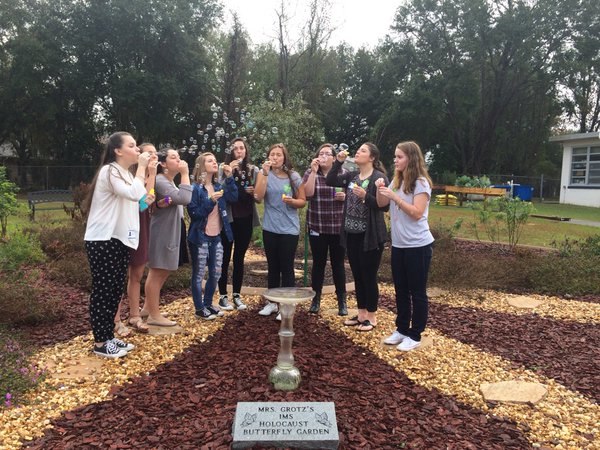Remembering the Lives Lost
How do we begin to remember the millions of victims of the biggest genocide in human history? How do we echo the gravity of the world’s loss to students? How do we work to create a meaningful moment that memorializes humankind’s greatest tragedy? In planning a Holocaust unit in conjunction with Holocaust Remembrance Day commemorations, these are questions that were prevalent in our minds as we devised a memorial program that paid tribute while emphasizing the need for continued human rights education in classroom’s across the world.
Last year, Mrs. Grotz challenged students with a writing assignment where they were tasked to identify a way to memorialize lives lost in the Holocaust and/or acts of genocide and terrorism, or to raise awareness around a social injustice they felt passionate about. This task resulted in a persuasive letter to our school administration and the county office requesting permission to plant a garden not only to remember the Holocaust, but as a medium to educate students on the Holocaust, enable reflection on the role of the individual in society, alter the climate of the school and advocate for tolerance and reverence for all life.
 Our students commemorate Holocaust Remembrance Day
Our students commemorate Holocaust Remembrance DayAs Remembrance day events evolved, so did our plans for what we could do this year to highlight the work of our students from years past and present, in a moment that bought together a generation tragically lost with the generation who have the ability to ensure such horror never occurs again. The 2015-16 unit supplemented new material with text used last year.
USC Shoah Foundation’s resource IWitness became a pivotal moment in much of our teaching, for it inspired our #beginswithme videos (an activity in which students created PSAs to pledge their dedication to a world in which they speak up) and exploration of modern day genocide in the Pyramid of Hate exercise. One student would later recalled some of these activities, when he chose to share what he had learned about the Holocaust during our services. Our students’ experiences with survivor testimony and IWitness activities not only introduce them to the Holocaust but also prepared them for this special event.
In our initial preparations for the day, we planned to release butterflies in the memorial garden in a quiet moment to reflect on those lives lost. Thanks to a grant secured by Miss. Fenech, we were able to purchase beautiful butterflies from The Butterfly Release Company in Central Florida. However, even with the best made plans, Mother Nature sometimes alters visions. Due to (what eventually we saw as appropriately timed) thunderstorms on Remembrance Day, IMS staff instead gathered on January 26th to release the butterflies. In a prophetic and profound moment, we watched them find their niche in the garden, and remembered that much like Maya Angelou once said, we celebrate the beauty of the butterfly and marvel at all the diverse species but rarely look at the changes it went through - the hardships - to achieve that beauty, just like we do with our fellow man.
When Remembrance Day dawned just 12 hours later, it dawned darkly: ominous clouds, heavy rain, and the loud rumbles of thunder served as fitting backdrop to this significant moment of mourning across the globe. With the assistance of Citrus High School’s talented JROTC, we gathered students across the campus to reflect in a ceremony lasting just over an hour. Teachers shared the successes of Holocaust education in the classroom; students shared how they had been affected; together we blew bubbles to remember the lives so tragically taken. While we paid tribute to the souls lost, we also celebrated and recognized diversity for its individual uniqueness and how it contributes to the making of our society.
Remembering the Holocaust is paramount to all societies: it serves as a symbol of the depravity of the human psyche, as well as a symbol of hope for the perseverance of the human spirit. January 27th marks an international day of reflection that extends beyond those 24 hours. In our community, we pledge never to forget. We pledge to educate. We pledge to speak up against injustice. We pledge to always remember.
Like this article? Get our e-newsletter.
Be the first to learn about new articles and personal stories like the one you've just read.